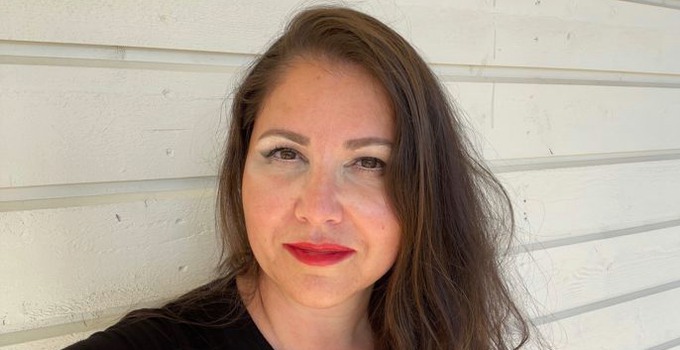
Aida Alvinius is a Professor at the Department of Leadership and Command & Control since April 1, 2024. Photo: Private.
"I want to contribute with new knowledge and make a difference"
Aida Alvinius' research spans areas such as leadership in crisis and war, gender, and sustainability in the workplace. She is driven by a strong commitment to create change.
"I even gave birth the same day I defended my PhD thesis. That might say something about my personality," she says.
This year marks 20 years since Aida Alvinius first joined the leadership department at the Swedish Defence University, initially as a research assistant in Professor Gerry Larsson's research group. She has recently been promoted to professor of leadership and management.
"Getting that temporary position 20 years ago opened my eyes to the leadership track and allowed me to work with something I am passionate about."
Experiences from the war in Bosnia
Aida Alvinius grew up in Bosnia and came to Sweden as a refugee in 1992.
"I was 13 when we arrived in Sweden, having experienced what it is like to live in a war, needing to run to bomb shelters, and lacking basic necessities."
Her experiences from the Bosnian civil war profoundly influenced her and formed the basis for her interest in social sciences.
"I have often pondered why wars happen and what makes neighbors suddenly start hating each other. This sparked a curiosity that eventually led me to research."
She completed her PhD in Sociology at Karlstad University in 2013 with a dissertation titled Bridging Boundaries in the Borderland of Bureaucracies - Individual Impact on Organisational Adaptation to Demanding Situations in Civil and Military Contexts, focusing on the individual's importance for collaboration in crisis.
Leadership during crisis and war
Since then, she has delved into various research areas, including leadership in crisis and war, gender, sustainable work life, and organizational studies.
"What's interesting about these areas is that they are constantly evolving and changing. Even though experiences from war and crisis recur, people need to adapt to new demands and environments, which means there is always new knowledge to contribute."
For example, she highlights her research on how school actors need to learn to manage crises, as they had to during the pandemic.
"Teacher training is not adapted to this type of crisis management, and most teachers do not want to deal with these issues; they want to teach. But pushing something onto the agenda despite resistance is important. We need to try to solve these new challenges together."
She also emphasizes her research on the growth of the Swedish Armed Forces and the potential growing pains it may entail as another issue she wants to bring to the forefront.
"I see a great need to raise this issue when I lecture on organizational diseases, gender, and sustainability in the workplace, both at military units and when I teach at the Higher Officers' Program at the Swedish Defence University. Many have 'aha' moments and appreciate that we dare to tackle these types of issues that are usually not given enough attention."
Aiming to create change
When asked about her current projects, Aida Alvinius mentions a scientific article on total defense that is about to be published, a book on resistance in the workplace in collaboration with colleagues at the Swedish Defence University, and a book on crisis leadership. She has a long publication list and many ongoing projects.
"I think it's because I feel a strong commitment. I even gave birth the same day I defended my PhD thesis. That might say something about my personality," she says.
Her water broke the evening before her defense, but after borrowing a wheelchair at the hospital and with the help of a friend who timed her contractions, she was able to proceed with the defense.
"I really didn't want to cancel, and it actually turned out to be feasible. Then I went straight from the post-defense celebration to the delivery room, and my son was born on the same day I earned my doctoral title."
She returns to her inner drive and desire to create change through research and teaching.
"Teaching is very important to me. It means a lot when former students reach out and tell me they have benefited from my teaching."
What does becoming a professor mean to you?
"I joke and say that professor is a diagnosis, not a title. It's not the title itself that is important, but the platform it provides. Contributing new knowledge, making a difference for students, and perhaps inspiring them to start researching."
Josefin Svensson
In brief:
At the Swedish Defence University since: 16 August 2004.
Currently:
"An article about total defense as a colossus on clay feet with Erik Hedlund, Perspectives on Resistance with Arita Holmberg and Maria Fors Brandebo. I also made it onto Expressen's list of Women of the Year 2024 (rank 80)."
When I'm off:
"Project manager at home, writing books and doing things with the family."
Last book read:
"Chateau at the End of the Road by Jessica Eriksson and Stefan Holm."
Hidden talent:
"If I weren't a researcher, I'd be an investigative journalist (according to my colleagues)."
Happy to discuss:
"Love! I'm so utterly tired of war!"
My driving force as a researcher:
"A thirst for knowledge! To impart knowledge and see my students further develop it. To work for a fairer world free from discrimination."
More about
Page information
- Published:
- 2024-07-02
- Last updated:
- 2025-05-13
